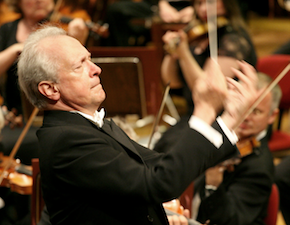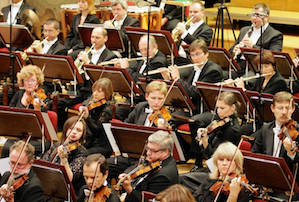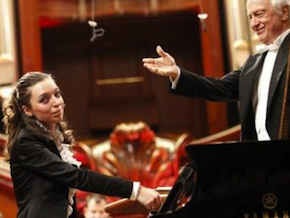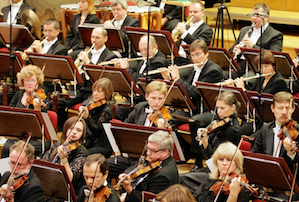
The Warsaw Philharmonic, which turned 111 years old this month, received a raucous reception Sunday and Monday in the orchestra's San Francisco debut. There were standing ovations galore, and on Monday, applause between every single movement of the concerto (perhaps acceptable) and the symphony (definitely not). The orchestra's acclaimed conductor, Antoni Wit, 68, finally had enough of the unusual newby behavior from the audience, and didn't pause before the last movement.
Otherwise, Wit and the orchestra well reciprocated the enthusiastic reception by giving more encores, in two concerts, than the San Francisco Symphony (now on an Asian tour) provides in an entire season.
The soloist, Yulianna Avdeeva, followed Sunday's Chopin Piano Concerto No. 2, with Chopin’s Waltz in A-flat Major, Op. 34, No.1, and — somewhat surprisingly — played an encore after Beethoven's big, demanding Piano Concerto No. 5 ("Emperor") on Monday: Bach’s Partita No. 1 in B-flat Major, BWV 825, Gigue.
The orchestra played three (!) encores each day, ending with Sousa's The Stars and Stripes Forever, after repeating the Polonaise ("Polonez" in Poland, the country of origin for this slow dance) from Wojciech Kilar's score for the film Pan Tadeusz.

The first encore Sunday was the Gavotte from Prokofiev's Symphony No. 1 in C Major, Op. 25; on Monday, it was Brahms' Hungarian Dance No. 5.
As you can see just from the encores, the orchestra is offering an international repertory, including Polish works, but otherwise spreading the goods around. Unlike the limited participation by women musicians in several European orchestras to this very day, the Warsaw is well balanced, with female principals in key positions, including the concertmaster on Sunday, and with great distinction, Dorota Cholewa on trumpet.
I think the concertmaster at the first concert was Ewa Marczyk, but apparently first chairs rotate and the orchestra list doesn't name principals. An interesting fact about personnel is that the Warsaw Philharmonic is the first visitor to Davies Symphony Hall in many years without a single Asian musician.
Their best offerings bracketed the orchestra's two-concert appearance. The opener, Witold Lutoslawski's 1951 Little Suite, is a delightful mix of humor and romantic sweep, and Wit conducted a seamless, beautifully balanced performance. Monday's closing work (before the encores, that is) was Dvořák;s 1890 Symphony No. 8 in G Major, Op. 88, played with similar excellence.
In the Dvořák, every section clicked, including the brass — which appeared in other works somewhat unreliable. Wit balanced dramatic and romantic passages, maintaining steady tempos (a challenge in the closing Allegro), while bringing out the sound of solo instruments exactly right. Fortes were powerful, not excessively loud, which is a temptation difficult to resist.

Sunday's Tchaikovsky Symphony No. 6 in B Minor, Op. 74 ("Pathétique") was not in the same class. A devilishly difficult piece with frequent (and sudden) changes of tempo and mood, the work waylaid the orchestra several times as slow passages became enervated, somnolent — not what Tchaikovsky had in mind. Also, the brass problems were more pronounced here, although the strings did notable work.
Avdeeva wooed the audience, but I didn't always find that special quality you look for in the performance of such warhorses as in her Chopin and Beethoven. She is a solid, reliable pianist with great technique and obvious understanding of the music. Still, especially in the Chopin, elegance and brilliance were in short supply — again, to these ears — while effort was both visible and audible.
The Beethoven fared better, in an unexceptional but faultless performance, impressing with strength and dexterity, but lacking in new insight or fresh statements. The notes were all there, but melodic lines at times trailed off instead of sustained, the cadenza was loud and fast to the point of slurring.
Still, the concert and the closing Dvořák left an excellent impression of the artists from Warsaw.

